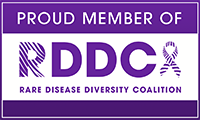
Last year, Rae shared her journey to a scleroderma diagnosis with us. This year for Pulmonary Hypertension (PH) Awareness Month, we’ve followed up with her to learn more about the disease she was diagnosed with just one month after scleroderma: Pulmonary Arterial Hypertension (PAH), a form of PH.
“I started noticing small difficulties with breathing,” Rae says. “I was getting a lot more winded going up stairs, trying to get on and off the bus to campus, and generally just feeling more fatigued.” Initially, she thought this was part of being a PhD student, or maybe a side effect of her new gym.
But things quickly worsened. Rae found herself struggling with very everyday activities. “I found I could barely walk 10 feet without having to stop and catch my breath,” she says. “All of these breathing difficulties prompted me to go back to the rheumatologist.”
Upon discussing her symptoms (including tightening skin) with her rheumatologist, “he diagnosed me with scleroderma and also suspected that I had pulmonary hypertension secondary to scleroderma.” She followed up with PH specialists for a VQ scan and a right heart catheter quickly. “The VQ scan didn’t show anything, but two days later I completed the right heart catheter that showed significantly reduced cardiac output and significantly elevated pressures in my lungs.”
Thinking back to those first months with diagnosis, Rae recalls how “the words ‘scleroderma’ and ‘pulmonary hypertension’ were new, and scary, and felt really big.” As a 25-year-old, she was shocked to be facing two life-threatening illnesses. “But I was so grateful I could name them, because to me that meant that my doctors and I could start working to do something about them.”
Rae also reflects on how advances in research mean better treatments for her PAH. “Years ago, the only treatment for PAH was a lung transplant,” she says. “Although there is still no cure for PAH, years of research has afforded the opportunity for all types of pills and medical pumps to be created which can treat PAH.”
And this is why research is so important to Rae. “I have benefited from some of those products that were derived from that medical research and none of that would have been possible without those initial research volunteers,” she says. “My participation in research is … a way to pay forward all the hope I have been granted through all the research that has come before me.”

